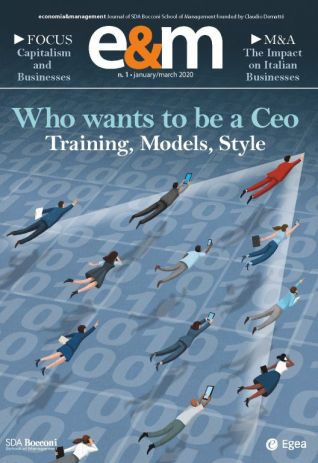E&M
2020/1
The Challenge of Complexity
CEOs are increasingly important figures of reference in our society. In today’s increasingly complex political and economic context, their role is not so much to reduce that complexity, but to manage it and explore the possibilities of what does not yet exist. In this scenario, CEOs are thus asked to express a new way of thinking, a new mindset.
DOI: 10.1485/1120-5032-202001-1
Pages 2-5
Download article as PDFCEOs in the New Social and Political Context
CEOs are increasingly important figures of reference in our society.[1] As illustrated annually by the Edelman report, trust in their regard is not only very high (76 percent of the population), but is constantly increasing (+11 points compared to 2018) and is considerably higher than trust in the State and its institutions (48 percent) or in media (47 percent).[2] Moreover, this trust is not limited only to their ability to guide the companies they lead, but it is a much broader trust in their leadership, the ability to guide social change and take an active part in the current debate on the main social issues and questions of today: from the environment to immigration, from individual rights to the future of democracy.[3] So it is not only society that is increasingly present in the corporate decisions made by CEOs – as recently stressed by the Business Roundtable on the purposes of corporations[4] – but the CEOs themselves are able to occupy a prominent role in the society and its collective decisions. The clear separation between these two perspectives – desired by Milton Friedman in his time[5] (for which the only social responsibility of corporations is to create profits for shareholders) and recently stressed by The Economist[6] – has in fact disappeared. Understanding this important change, analyzing the figures who most represent the connection between business and society – CEOs – is the subject of this issue and the dossier.
If we follow the suggestion given by Adam Smith, who stated that “the understanding of the greater part of mankind is necessarily formed by their ordinary employments,”[7] to understand the meaning of being a CEO, we must first of all examine the current and future challenges and the “employments” that await them. What emerges from the contributions in this dossier is the breadth of these transformations and the depth of their impact. CEOs must be strongly oriented toward the business and the client (Castaldo-Grosso-Villa) and towards digital transformation (Gemmo-Isari), but they must also develop diplomatic abilities, often at the international level, with respect to numerous other actors and external subjects (Fontana-Cino) and stake out positions regarding the issue of sustainability (Pogutz-De Silvio-Perrini).
This gradual inclusion of traditionally external (or in any event extraordinary) issues with respect to business activities highlights the gradually increasing complexity of the ordinary duties of CEOs. This does not mean that our society is necessarily more complex than previous ones. All capitalist societies, from their inception, have been characterized by a high degree of complexity. To reduce the complexity of the environment, however, each system tends to increase its own internal differentiation, i.e. to create specialized sub-systems, each with its own area of competence.[8] When the skills required expand, and thus specialization disappears, complexity cannot but increase. Upending Smith, we could say that the extension of the environment to be covered (that is no longer only the market) reduces the division of labor for the CEO and increases its complexity.
The gradual erosion of certain traditional airtight compartments is undoubtedly positive and removes those aspects of ambiguity that are at the root of certain corporate behavior, that more or less consciously, can produce amoral consequences. Indeed, often “what is right in a firm does not necessarily correspond to what we consider right in our home or in church. What is right is what the person above demands from the one below. This is the concept of morality in firms.”[9] This clear separation explains why people we consider above reproach in daily life can make decisions with negative consequences that pollute the environment, that exploit workers or that deceive consumers. If firms were to adopt the morals of the society in which they operate, this type of phenomena could disappear.
Yet in a recent debate at the Said Business School at the University of Oxford, Paul Polman – the former CEO of Unilever – pointed out that this may not be sufficient: “You won’t find any CEOs who say ‘I want more air pollution, I want to cut more forests, or I want more people to go to bed hungry.’ So we are practically all good people and we think we are doing the right thing. In every firm’s annual report there is now a section on social responsibility that essentially states: ‘I’m not the problem because I’m doing this and that. And if the problem remains, then it means that someone else is not doing the right thing.” But if we’re all good people then why do our initiatives not add up collectively so we can see the results? Perhaps because even if the direction is correct, the dimension and speed with which we move are not sufficient. Or maybe because in our current system any change will automatically take us back to the starting point, or in any event not far from it. If we are not bad people and if we don’t see significant improvements it is because we are forced to move within the confines of our current system.[10] This means that the separation between what’s right in businesses and society does not seem to be limited to the confines expressed exclusively by the former, but is much broader and deeper, and regards our current capitalist system (see the focus on European capitalism in this issue of the magazine) and the systems of corporate governance that for the most part are a reflection of that system (Minichilli-Montemerlo).
In this scenario of increasing complexity, CEOs are asked not only to think in new ways, with a new mindset (Magatti-Cecchinato), but to develop a new way of being, that goes beyond the autonomy of the individual, to necessarily include relations with others and a common identity (Coda). To paraphrase Marx,[11] it is their social being in this changed context that necessarily determines their conscience. One the one hand, investment in their training becomes essential (Daveri-Soda); on the other, it is important to have leadership and organizational models of reference through which CEOs can manage that complexity in enterprises. By using this consolidated metaphor, these models often oscillate between two apparent extremes: the cooperative model of a symphonic orchestra and that of a jazz band (see the articles by Grando and Cappetta on Sergio Marchionne). In the first case, the orchestra conductor is the head of cooperation, the sovereign figure. Without him the players go silent or play out of tune. In the second case, it is the harmonic theme that organizes and governs the possibility for everyone to speak. There is not less discipline or technique or unity with respect to the orchestra. It’s not that everyone does what they want. They are different collectives, with a different distribution of visibility and responsibility. It is interesting to note that precisely this second approach is the one with which the Italian top managers identify the most, and that after sincerity, democracy represents the most important guiding value (Galano).
In closing, it is even more important to return to the starting point of our editorial, to note how there has been a reversal in our society of the positions traditionally expressed by politics and business. The point is that our political imagination maintains all of the arrogance of the pretensions of sovereignty and keeps its trust in command and obedience, while CEOs seem to cultivate a more participative and representative idea. The trust expressed by civil society in CEOs, however, could conceal the need for a “strong man,” recently detected in the Censis report as well,[12] in which the key point is not that the substance of how a question is decided, but that it be decided quickly and finally. As our dossier shows though, the CEOs task is not to reduce complexity. Political power is required to simplify the world, to make sense of things, to introduce order into chaos. The task of firms and CEOs is exactly the opposite, to strengthen complexity and manage it, not reduce it; not to represent what exists, but to explore the possibility of things not yet present. Confusing the two levels is thus imprudent and the greatest danger is precisely this inversion of roles: considering society and the state as businesses to be managed with hierarchical and authoritarian models, and firms as democratically legitimized sovereign states; politicians who transform into CEOs and CEOs who believe they are political leaders. Enjoy the issue!
Fabrizio Perretti is the Director of E&M and Professor of Corporate Strategy at the Bocconi University.
2019 Edelman Trust Barometer Global Report, https://www.edelman.com/sites/g/files/aatuss191/files/2019-02/2019_Edelman_Trust_Barometer_Global_Report.pdf.
A.K., Chatterji, M.W. Toffel, “Divided We Lead: CEO Activism Has Entered the Mainstream,” Harvard Business Review (website), March-April 2018.
“Business Roundtable Redefines the Purpose of a Corporation to Promote ‘An Economy That Serves All Americans’”, Business Roundtable, August 19, 2019, https://www.businessroundtable.org/business-roundtable-redefines-the-purpose-of-a-corporation-to-promote-an-economy-that-serves-all-americans.
M. Friedman, “A Friedman doctrine: The social responsibility of business is to increase its profits,” The New York Times Magazine, 13(1970), pp. 32-33.
“Big business is beginning to accept broader social responsibilities,” The Economist, August 22, 2019, https://www.economist.com/briefing/2019/08/22/big-business-is-beginning-to-accept-broader-social-responsibilities.
A. Smith, La ricchezza delle nazioni, Turin, Utet, 1975, p. 949.
See N. Luhmann, Potere e complessità sociale, Milan, Il Saggiatore, 1979.
R. Jackall, Labirinti morali: il mondo ambiguo dei manager, Edizioni di Comunità, Rome-Ivrea, 2001.
“Paul Polman: Answering the call,” Saïd Business School, University of Oxford, youtube, November 20, 2019 https://www.youtube.com/watch?v=Xu7Vyoc9j38&t=1703s.
K. Marx, Per la critica dell'economia politica, Roma, Editori riuniti, 1957.
According to the 53° Censis report in 2019, one out of two Italians (48.2 percent) believes there should be a "strong man in power" to manage public affairs.




